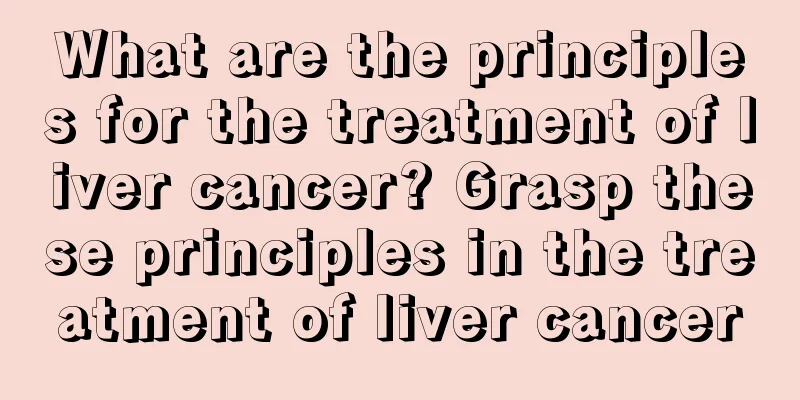What are the principles for the treatment of liver cancer? Grasp these principles in the treatment of liver cancer

|
Facts have proved that retreatment is the key to improving the efficacy. Re-treatment of liver cancer recurrence and metastasis, such as interventional treatment through the hepatic artery, multiple treatments with injection of anhydrous alcohol, microwave solidification, focused ultrasound treatment, etc., can further improve the efficacy. In general, the treatment principle of liver cancer is mainly based on early treatment and comprehensive treatment. This is an important condition to ensure the success of treatment and the prognosis of long-term survival. However, the treatment of liver cancer in the later stage is very troublesome, and it is necessary to consider the specific location of the tumor and whether it has metastasized. The following is a specific introduction to the treatment of liver cancer: ⑴ Early treatment: The smaller the liver cancer, the better the efficacy after radical treatment. At present, the 5-year survival rate after resection of small liver cancer is 60%~70%, while the 5-year survival rate after resection of large liver cancer is only about 20%. ⑵ Comprehensive treatment: There is no specific treatment for liver cancer so far. The rational and planned comprehensive application of multiple methods has significantly improved the efficacy. ⑶ Active treatment: Facts have proved that retreatment is the key to improving the efficacy. Re-treatment of recurrent and metastatic liver cancer, such as interventional treatment through the hepatic artery, multiple treatments with injection of anhydrous alcohol, microwave solidification, and focused ultrasound treatment, can further improve the efficacy. Surgical resection is the preferred method for early liver cancer. If the tumor is deep and surgery is difficult, percutaneous anhydrous alcohol injection can be used. Interventional treatment through arterial catheterization or other treatments can also be used. For the treatment of stage II liver cancer, surgery is also the first choice. The surgical method can be divided into radical resection and palliative resection according to the condition. It can be combined with intra-arterial chemotherapy and embolization, or anhydrous alcohol injection during surgery. The preferred treatment method for stage III liver cancer is intra-arterial catheter chemotherapy and embolization. If possible, a second-stage surgical resection is performed after the tumor is reduced. The early treatment of liver cancer and the treatment methods in the middle and late stages are obviously different, but it is very important to choose the best treatment operation according to the patient's specific condition. The treatment of liver cancer in the late stage is mainly to prolong life and control the progression of the disease, but it cannot cure liver cancer. |
>>: How do you get lung cancer? The main causes of lung cancer are as follows
Recommend
What dietary habits should liver cancer patients pay attention to? Liver cancer patients should maintain three major dietary habits
When it comes to liver cancer, many people are fa...
What is the reason for itchy heels
If the heels are itchy, it is usually caused by a...
How much does skin cancer medical treatment cost
How much does it cost to treat skin cancer? For s...
Why does the left side of my back hurt when I breathe?
What are the causes of pain on the left side of t...
What to do if you have constipation? These defecation methods are very practical!
Under normal circumstances, it is normal to have ...
Transmission routes of Acinetobacter baumannii
Acinetobacter baumannii is a pathogen with a wide...
How to prevent variant asthma
In life, many people confuse colds and asthma, bu...
Introducing the causes of testicular cancer
In real life, some people feel that they have con...
Is blood sugar 11.6 after a meal high? Timely control is very important
If the blood sugar level after a meal exceeds 11....
What is the best diet for lung cancer? Diet care for lung cancer
Society has developed and living standards have i...
Is it okay to always use makeup remover oil if there are red blood streaks on the face?
Everyone's skin is different. Some people hav...
I feel like there is something foreign in my throat when I smoke
Many people like to smoke in life, but smoking ha...
Can acne be cured
For friends who are often troubled by acne, they ...
Is titanium harmful to the human body?
No matter what kind of substance it is, it is har...
My belly suddenly got bigger and harder
Sometimes we don’t have a very good understanding...









